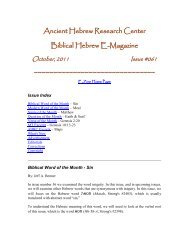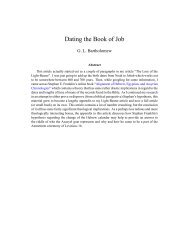My Name Forever - Ancient Hebrew Research Center
My Name Forever - Ancient Hebrew Research Center
My Name Forever - Ancient Hebrew Research Center
Create successful ePaper yourself
Turn your PDF publications into a flip-book with our unique Google optimized e-Paper software.
<strong>My</strong> <strong>Name</strong> <strong>Forever</strong> 12<br />
loss of the v- ending of the usual imperfect. 37 The third person masculine imperfect of Hei Yud Hei /v/h/v<br />
is yih’yéh vh vh. The shortened form is y’hí h vh. Although we have no concrete witness as to the long form<br />
of the third person masculine imperfect of Hei Vav Hei /v/u/v, we have the shortened form - y’hú U vh.<br />
Working backwards from there, based on the vowel pattern of yih’yéh vh vh, the grammarians surmise that<br />
the regular imperfect is yih’véh (yih’wéh) 38 vu vh or yehevéh (yehewéh) vuvh as seen in the last two quotes<br />
above.<br />
37. It seems odd, though, does it not, that the form of the <strong>Name</strong> as it appears within so many personal<br />
names reflects not the usual form of the imperfect, but the shortened form, the form that usually stands for<br />
the jussive? So, what about Ecc. 11:3? Are we to understand it as, “Where the tree falls, there let it be?”<br />
Is it a jussive? Actually, no, it is not. Gesenius, in his <strong>Hebrew</strong> Grammer, says the jussive is often used for<br />
the regular imperfect. He cites twenty specific instances where y’hí h vh is used in place of the full form<br />
yih’yéh vh vh<br />
Moreover, in not a few cases, the jussive is used, without any collateral sense, for the<br />
ordinary imperfect form, and this occurs not alone in forms which may arise from a<br />
misunderstanding of the defective writing... but also in shortened forms, such as h vh Gen<br />
49 17 (Sam. vh vh), Dt 28 8 , 1S 10 5 , 2S 5 24 , Ho 6 1 , 11 4 , Am 5 14 , Mi 1 2 , Zp 2 13 , Zc 9 5 , R<br />
72 16f. (after other jussives), 104 31 , Jb 18 12 , 20 23.26.28 , 27 8 , 33 21 , 34 37 , Ru 3 4 .” 39<br />
38. It is evident that in the passages cited above by Gesenius, where y’hi h vh is used for the ordinary<br />
imperfect, the final Hei v of the full imperfect form disappears. This is common for Lamed-Hei v"k<br />
jussives. It is also evident that in Ecclesiastes 11:3 where y’hú tU vh is used for the ordinary imperfect, it<br />
does not lose its final letter, but exchanges it for an Aleph t. This is most uncommon for Lamed-Hei v"k<br />
jussives. Should we understand this phenomenon as a “perfectly Syriac form” as Benjamin Davidson<br />
says? Or should we go with the opinion of Gesenius that the true reading of Ecc. 11:3 is found in the few<br />
manuscripts which read sham hu tUv o J (there he is) instead of sham y’hú tU vh o J (there he will be)? 40<br />
Or is there yet another way of looking at it? Could it be that this shortened form of the imperfect, which<br />
does not lose its final letter, is used for the usual imperfect because the usual imperfect was never used for<br />
this particular verb? Perhaps we should abandon our search for the “ordinary imperfect” of Hei Vav Hei<br />
/v/u/v and view y’hú tU vh as the legitimate heir to the throne. Perhaps in this particular Lamed-Hei v"k<br />
verb the jussive and imperfect are not merely interchangeable as they appear to be in other Lamed-Hei<br />
v"k verbs, 41 but indistinguishable.<br />
39. Stop and think for just a moment. The <strong>Name</strong> is a third person singular, masculine, Kal future<br />
verbal form from the three letter root Hei Vav Hei /v/u/v (to be). At the end of Michaiah’s name it is<br />
sometimes represented as Y’hu Uvh. It drops the final Hei v as it does within every man’s name. It is a<br />
shortened form. Y’hú(t) tU vh in Ecc. 11:3 is also a third person singular, masculine, Kal future verbal<br />
form, from the root Hei Vav Hei /v/u/v. It, too, is a shortened form, but does not drop its final letter.<br />
37 Gesenius: Grammar, p. 210.<br />
38 In modern Israeli <strong>Hebrew</strong>, the waw u of Biblical <strong>Hebrew</strong> has a “v” sound.<br />
39 Gesenius: Grammar, p. 323.<br />
40 Gesenius: Grammar, p. 211.<br />
41 Gesenius: Grammar, pp. 211-212.






